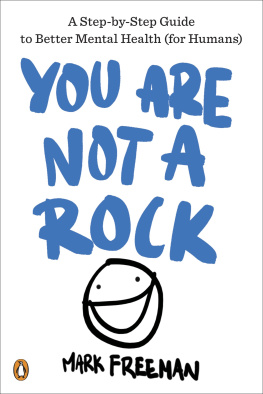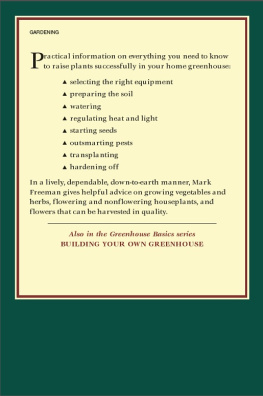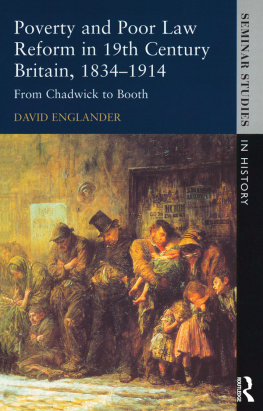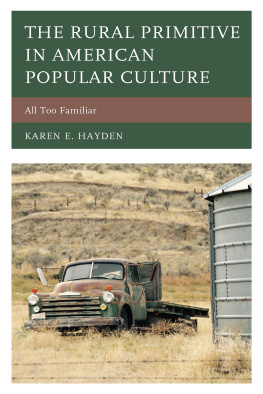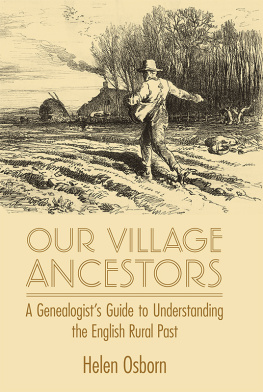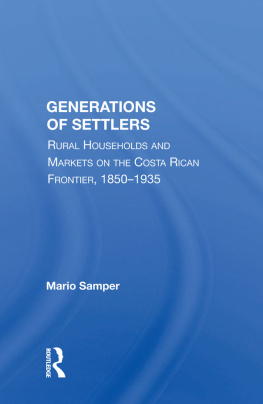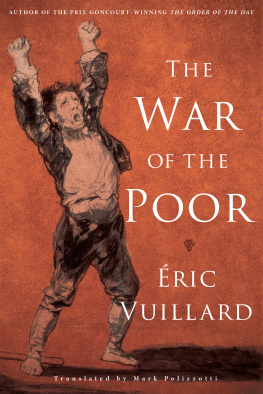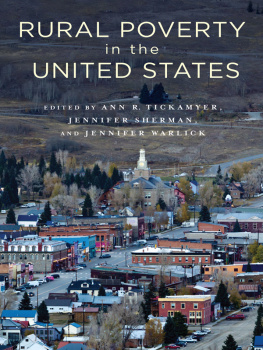First published 2005 by Pickering & Chatto (Publishers) Limited
Published 2016 by Routledge2 Park Square, Milton Park, Abingdon, Oxon OX14 4RN711 Third Avenue, New York, NY 10017, USA
Routledge is an imprint of the Taylor & Francis Group, an informa business
Copyright Taylor & Francis 2005
All rights reserved, including those of translation into foreign languages. No part of this book may be reprinted or reproduced or utilised in any form or by any electronic, mechanical, or other means, now known or hereafter invented, including photocopying and recording, or in any information storage or retrieval system, without permission in writing from the publishers.
Notice: Product or corporate names may be trademarks or registered trademarks, and are used only for identification and explanation without intent to infringe.
BRITISH LIBRARY CATALOGUING IN PUBLICATION DATA
The English rural poor, 1850-1914 1. Great Britain Rural conditions 19th century Sources 2. Great Britain Rural conditions Sources I. Freeman, Mark, 1974 307.7'2'0941'09034
ISBN-13: 978-1-85196-822-0 (set)
Typeset by P&C
DOI: 10.4324/9781003113669
Mann, 'Life in an Agricultural Village in England'
DOI: 10.4324/9781003113669-1
H. H. Mann, 'Life in an Agricultural Village in England', Sociological Papers, 1 (1905), pp. 163-93
Dr Harold Hart Mann's concise social survey of the village of Ridgmount in Bedfordshire, carried out in 1903, was the first attempt to apply the methods and concepts pioneered by B. Seebohm Rowntree to a rural community. Rowntree, building on some of the ideas of Charles Booth, who commenced a large survey of London in the 1880s, investigated his home city of York in 1899. His book Poverty: A Study of Town Life (London: Macmillan, 1901), reported the results of this survey, which was based on personal visits made by an investigator to every working-class household in the city. On the basis of these visits, together with income data supplied to him by employers in York, Rowntree described the extent and causes of poverty in the city. Rowntree distinguished between two kinds of poverty: primary poverty, experienced by those 'whose total earnings are insufficient to obtain the minimum necessaries for the maintenance of merely physical efficiency'; and secondary poverty, where 'total earnings would be sufficient for the maintenance of merely physical efficiency were it not that some portion of it is absorbed by other expenditure, either useful or wasteful'. Although Rowntree himself never attempted to investigate a rural community in the same way, Mann's survey was offered to the editors of the Sociological Papers through his 'intermediacy' (p. 5).
B. Seebohm Rowntree, Poverty: A Study of Town Life (Bristol: Policy Press, 2000 [1st edn 1901]), pp. 86-7.
Ibid., p. 142.
Mann followed Rowntree's methods closely, defining primary and secondary poverty in a very similar way although he found that, in Ridgmount, primary poverty was much more widespread than secondary poverty (p. 28). He also examined the causes of primary poverty under the same headings that Rowntree had done. Although investigating a rural community was perhaps somewhat easier than a large city, as far fewer households had to be examined, the wider variety of resources available, including allotments and pigs, meant that the determination of household income was not always easy. Like Rowntree, he found that low wages were responsible for a large proportion of primary poverty. In total, 34.3% of the population of Ridgmount lived in primary poverty, lacking the resources to maintain themselves in a condition of physical efficiency, and a further 7.1% were in secondary poverty. Although Mann (unlike Maud Davies, whose longer survey is also reprinted, in part, in this volume) did not systematically investigate the 'character' of the Ridgmount population, he did not wholly avoid commenting on it: for example, he thought the limited extent of "secondary poverty' was due to landlords who were particular as to the character of their cottage-tenants' (p. 27).
See Mark Freeman, Social Investigation and Rural England 1870-1914 (Woodbridge: Boydell and Brewer, 2003), pp. 116-24, for a more detailed consideration of these methodological difficulties.
Mann was born in 1872 and educated in Yorkshire. A natural scientist, he was a graduate in chemistry from the Pasteur Institute in Paris, and referred to social research as 'merely his hobby'. Mann also lectured at the London School of Economics, and died in 1961.
Daniel Thorner, 'Introduction', in Harold H. Mann, The Social Framework of Agriculture: India, Middle East, England (London: Frank Cass, 1967), p. xix.
H. H. Mann, 'The Untouchable Classes of an Indian City', Sociological Review, 5 (1912), pp. 42-55.
LIFE IN AN ENGLISH VILLAGE
LIFE IN AN AGRICULTURAL VILLAGE IN ENGLAND.
[The inclusion of this paperoffered by the author through the intermediacy of Mr. Seebohm Rowntreein a volume professedly sociological, calls for a word of explanation.
The distinction between what properly belongs to Sociology and what is internal and technical to the several social sciences, whether economic or other, is not always easy to make. But in this case, one may admit that Mr. Mann's investigation was made from a point of view mainly economic, and yet claim for it a place alongside those "Monographies Sociales" of the Le Play investigations which mark an important phase of transition in studies alike sociological and economic. The change from the more abstract and general writings of the older economists to the more concrete, geographical, and particular investigations of Le Play, Booth, Rowntree, etc., is itself indicative of a growing re-orientation of Economics in a sociological direction, i.e., its re-organisation as a specialised department of a generic sociological science. Mr. Mann's paper is noteworthy as continuing and developing this sociological re-orientation of Economics, and it gains further importance from beingwe believethe first effort to apply the Le Play-Booth method in a comprehensive way to English village life.EDITORS.]
BY P. H. MANN.
I.
During the past few years the whole question of the economic condition of the population of the cities and towns in England has come before the public in a measure far greater than at any earlier time. This result has been largely due to the admirable investigations made by Mr. Charles Booth in London, and by Mr. Seebohm Rowntree in York. To complete the chain of evidence as to the economic position of the people it seems of great interest and importance to follow the methods used by these investigators in obtaining evidence as to the life in our agricultural villages in different parts of the country. The following is an attempt to obtain, in so far as my spare time and that of my coadjutors allowed, and to set out information, obtained during the autumn of 1903, as to the condition of the population of a Bedfordshire village, which lies in the centre of one of the largest purely agricultural districts in England.




